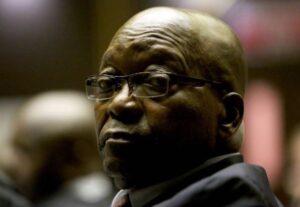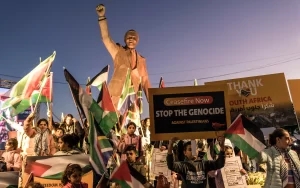By: Clyde N.S Ramalaine
Each year on the 10th of April, a curious and troubling ritual unfolds. Beneath the solemn tones and carefully staged imagery, the leadership of the African National Congress (ANC) the South African Communist Party (SACP) and COSATU ( Congress of South African Trade Unions) otherwise known as the Tripartite Alliance gather to remember Chris Hani—not as comrades who live his truth, but as political actors in search of borrowed credibility. For a single day, they wrap themselves in the flag of a man whose life was defined by service to the poor, ethical courage, and revolutionary conviction. And then, as predictably as the cameras disappear, so does their memory of him.
To honour Hani is to confront uncomfortable truths. And the most searing of them is this: those who today invoke his name the loudest are often those who have betrayed his legacy the most significantly.
The Theatre of April 10 – A Day of Posturing
Let us speak plainly: Hani’s name is used by people who do not live his values. For 364 days of the year, many of those in leadership today do not speak of him, do not evoke his vision, do not act in his spirit. Yet on this single day—April 10—they emerge, as if summoned by a calendar, to claim kinship with a man they have betrayed. His name is now routinely invoked to entrench factional battles within the ANC. On one hand, are those who allege that elements within the Tripartite Alliance may have been complicit in his assassination; on the other, those who parade in their undeniable neoliberal kaftans, having long capitulated to the hegemony of capital and white supremacy, yet still claim allegiance to his legacy.
But Hani’s life did not begin and end on that fateful day in 1993.
Hani’s life did not begin and end on April 10, 1993. To reduce his legacy to the single moment of his assassination is to commit a grievous injustice — not only to the man himself but to the complex, burning struggle that shaped him and which he, in turn, helped shape. Long before he became a martyr of democracy, Chris Hani was a committed revolutionary, forged in the heat of the Wankie campaign — a fateful attempt in 1967 by the joint forces of Umkhonto we Sizwe and the Zimbabwean People’s Revolutionary Army to pierce apartheid’s militarised border and launch a sustained guerrilla insurgency. Though ultimately unsuccessful militarily, Wankie was a crucible for a generation of cadres who tasted death, exile, and betrayal, yet refused to abandon the dream of a liberated South Africa. Hani was among the few who emerged not only as a survivor, but as a symbol of moral courage, collective discipline, and a defiant belief in the people’s cause.
Chris Hani was more than a soldier — he was a thinker, a poet of the revolution, a man drawn to literature and philosophy as much as to strategy and sabotage. He was a realist in the most radical sense: someone who sought not merely to free people from oppression, but to reimagine their humanity beyond it. He read voraciously, wrestled with contradictions, and carried within him the weight of those who could no longer speak. Hani never detached himself from the ordinary — from the township, from the struggle of the working class, from the scent of soil and the memory of cattle in Cofimvaba. His humility was not performance but principle. And so, on that fatal Easter weekend of 1993, knowing full well the threats to his life, he chose to send his bodyguards home — because their families mattered too. That act, so simple yet profound, tells us more about the kind of leader he was than any monument or posthumous praise ever could.
Chris Hani was not only a revolutionary and intellectual, but also a man deeply anchored in his Christian faith—a dimension of his life too often eclipsed by dominant narratives that emphasise his Communist affiliations. It is a matter of public record that Hani once harboured aspirations of becoming a priest, a vocation he considered with sincere conviction in his formative years. His spiritual sensibilities, shaped by the moral teachings of Christianity, informed his ethical commitment to justice, human dignity, and solidarity with the oppressed.
To portray Hani solely through the lens of Marxist ideology is therefore to impose a reductive binary that ignores the complex, and at times convergent, relationship between his political and spiritual convictions. His faith was neither ornamental nor incidental, but an integral part of his moral compass—a compass that guided his unwavering pursuit of liberation, not just in structural terms, but in the deeper, existential sense of human redemption.
I have often reflected on the extent to which the radical historical figure of Jesus—who defied religious orthodoxy and challenged entrenched political structures—influenced the formation of Martin Thembisile Hani into the Chris Hani we so readily invoke today. It is worth considering how this subversive dimension of Christian thought may have shaped Hani’s moral vision, his profound sense of justice, and his uncompromising commitment to the oppressed. Such a perspective invites a more nuanced understanding of Hani—not merely as a revolutionary shaped by Marxist-Leninist thought, but also as one potentially inspired by the radical ethics and emancipatory impulse embodied in the life and teachings of Jesus of Nazareth. Hani is also not unique in such a complex dynamic of identity.
It is thus a travesty to pretend that Martin Thembisile Hani lived only one day — as if his life were a mere prelude to his death. He lived intensely, sacrificially, with a clarity that continues to expose the mediocrity and cowardice of those who now exploit his image for political gain. Hani did not die to be remembered; he lived to serve, to challenge, to build. To honour him is not to cry over April 10 alone, but to wrestle daily with what it means to be free, to be brave, to be fully human in a country still haunted by unfinished revolutions.
His death may have served the goals of a combination of white reactionaries and ANC- Tripartite Alliance self-serving leaders—but his silence in our national conversation today serves the interests of the self-serving factionalists who parade as his heirs.
Let us strip away the pageantry of the April 10 commemorations to confront the political establishment with a haunting question. To these leaders, I pose one simple question: Where is your Chris Hani during the rest of the year? Where is his name when VAT increases are passed without conscience? Where is his courage when tenders are stolen and public funds looted? Where is his humility when your cars arrive, your wines are poured, and the poor bury their children in dry earth?
You have no authority to invoke his legacy if you will not live by it. You do not represent him. You are not his comrades. At best, you are false prophets in struggle regalia; at worst, you are opportunists trading in the moral currency of a man whose vision you have buried. It is my assertion and diagnosis that the liberation struggle has become stagecraft.
From Vanguard of the Poor to Custodians of Corporate Capture
Chris Hani’s commitment was not abstract—it was rooted in the concrete struggle for a South Africa where the poor were not statistical afterthoughts, but the heartbeat of national purpose. Yet today, under the stewardship of the ANC-SACP alliance, we have witnessed a grotesque distortion: the transformation of governance into a tool of elite self-enrichment.
The recent VAT debacle tells the whole story in miniature. While proposing an increase in Value Added Tax—an indirect tax that hits the poor hardest—the state simultaneously shields politically connected corporations from scrutiny and accountability. What clearer evidence of moral dislocation can there be than the choice to tax the mealie meal of the hungry, while the beneficiaries of inflated state contracts dine on opulence?
Chris Hani once warned against “the rise of a black elite that becomes a carbon copy of what we fought against.” Today, that warning is not a distant threat; it is the daily architecture of our political economy.
From Sacred Memory to Political Amnesia – The Erosion of Legacy and the Fall of Revolutionary Conscience
This Tripartite leadership does not merely fail to serve the poor in life—it fails even to honour the dignity of the dead. One only needs to visit the ruins of memorials such as the Cradock Four – Matthew Goniwe, Fort Calata, Sparrow Mkonto, and Sicelo Mhlauli. The Winnie Mandela Museum in Brandfort, or stand in the neglect of Freedom Square in Kliptown, to witness the abandonment of memory as a political value. These sites, once sacred spaces for reflection and public education, lie in disrepair while officials arrive in German sedans, deliver platitudes behind blue-light convoys, and then vanish. The desecration of such sites is not an accident of administrative incapacity—it is the visible symptom of a ruling elite that no longer believes in the moral continuity between struggle and governance.
On the day these sites were inaugurated, they arrived adorned in expensive accoutrements and luxury vehicles. Yet, as soon as their backs were turned to continue their hedonistic celebrations, they neglected to hold even those appointed in their nepotistic favour accountable for maintaining these sites..
Once self-proclaimed as the vanguard of the workers’ struggle, the SACP today has been relegated to the status of a Cabinet guard, functioning largely as a public relations department for the state’s neoliberal and technocratic agenda. Its transformation from a worker-driven revolutionary formation into an appendage of state bureaucracy is not merely a political tragedy—it is a historic betrayal. It is in this ideological retreat, from worker solidarity to political sycophancy, that the legacy of Hani is perpetually failed. The party of Joe Slovo, Moses Kotane, and Chris Hani now stands muted in the face of inequality, corruption, and imperial appeasement—its red is no longer a symbol of struggle but of retreat.
From Selfless Servant to Self-Serving Cabal
Chris Hani lived with simplicity and died with dignity. He never drove luxury vehicles, never barricaded himself behind walls of private security, and never treated the movement as his personal empire. Contrast that with the present spectacle: Cabinet ministers crisscrossing the globe in business class, chauffeured between mansions, while South Africans suffer under blackouts, ballooning costs, and collapsing services.
The revolution Hani gave his life for has been turned into a lifestyle brand—an aesthetic of struggle without the substance of sacrifice. The ANC-SACP elite quote Hani’s speeches but recoil from his ethics. They wear the regalia of struggle, yet refuse to do the one thing that made Hani great: live for something bigger than themselves.
Tripartite Alliance Continues Celebrating Apartheid’s Superior White Identity
The current ANC leadership’s posture of tolerance towards right-wing formations such as AfriForum and Solidarity reveals a disturbing ideological surrender to apartheid’s lingering cultural hegemony. While these groups openly challenge the legitimacy of South Africa’s post-apartheid project and seek to protect the interests of white minority capital under the guise of civil rights, the state has shown a shocking level of deference—engaging them in formal negotiations and affording them political respect not extended to grassroots black civil society or apartheid-era victims’ organisations. This selective appeasement reveals a subconscious veneration of white identity as inherently rational and deserving of state recognition, while black pain is treated as unruly, angry, and unworthy of political engagement. In this dynamic, the ANC not only fails to challenge racial injustice—it reproduces it.
One dares to challenge the post-apartheid state that continues to privilege white sentimentality over black historical pain and grassroots justice.
What, then, is this annual ritual of remembrance but a performance? One that comforts the powerful with the illusion of moral continuity, while the country descends deeper into inequality, despair, and democratic erosion?
Democracy in Name, Corruption in Practice
Hani believed in a radical democratic transformation—not merely replacing one flag with another, but replacing the logic of domination with the ethics of justice. His was a call for a people’s democracy: accountable, transparent, and just. And what have the ANC and SACP given us?
They have given us the instalments of state capture real and fake as governance of diverse types. They have allowed the security apparatus to be turned against whistleblowers and activists. They have presided over a Parliament that too often resembles a circus of evasion and insult. They have turned our democratic project into a hollowed-out stage where real power is wielded not by the people, but by corporate intermediaries in suits, some of them seated comfortably at BUSA meetings, whispering in the ears of Cabinet ministers.
The democratic revolution has not been delayed. It has been deferred—and deliberately so—in service of elite continuity masked as transformation.
COVID Pandemic Profiteers – Looting in the Shadow of Death
The recorded theft of billions during the COVID-19 pandemic remains one of the most chilling indictments of the moral decay at the heart of the ANC-SACP and COSATU alliance. In a moment of national trauma—when ordinary citizens were dying, hospitals were overwhelmed, and hunger stalked working-class communities—political hyenas and bureaucratic scavengers emerged from the shadows to feast on emergency funds. The procurement of personal protective equipment, food parcels, and medical supplies became a marketplace of corruption, with politically connected figures enriching themselves amid the collective grief.
What makes this episode all the more damning is the near-total absence of consequences. Investigative reports were issued, names were named, and outrage flared—yet the machinery of justice remained curiously inert. Not a single high-ranking official has been imprisoned for the brazen looting that took place during a time of national crisis.
If ever there was a moment to ask whether this leadership embodies the values of Chris Hani, it is this: when the poor were gasping for breath, you sold their oxygen. This was not just corruption—it was betrayal in its most grotesque and unforgivable form.
Until You Return to Hani’s Path, You Have No Right to Celebrate Him
We have a moral duty to have Hani’s legacy reclaimed from political convenience, from the control of thespians, enactors and duly returned to public conscience that must inspire us all to do better.
Until the ANC and SACP realign themselves with the principles of service, humility, and radical justice that animated Chris Hani, their commemorations will remain empty—rituals of remembrance performed by those who have forgotten.
Today, we honour not your slogans, but the man behind them. We remember not the speeches, but the soul. And we commit, in spite of you, to resurrecting the democratic, ethical, and revolutionary legacy of Chris Hani from the mausoleum of political convenience you have entombed it in.
Because Chris Hani does not belong to the ANC. He does not belong to the SACP. He does not belong to COSATU. He belongs to the people. And we the people will remember him—not by ritual, but by revolution.

BTh. (Hons-Status) UWC, MA Systematic Theology cum laude NWU, Ph.D. [Politics & International Affairs] UJ.
Lifelong Social and Economic Justice Activist, Christian Theologian, Political Analyst, Published Author & Poet, Freelance Writer, Strategic Advisor and Executive. A former University of Johannesburg SARChi & CADL [Centre for African Leadership Development] Post-Doctoral Research Fellow. Founder of TMOSA Foundation [The Thinking Masses of South Africa] & Founder Anchor host of the RamalaineTalk Blog, on Contemporary Analysis and Comment on Political Discourse in South Africa, including also Global context.







